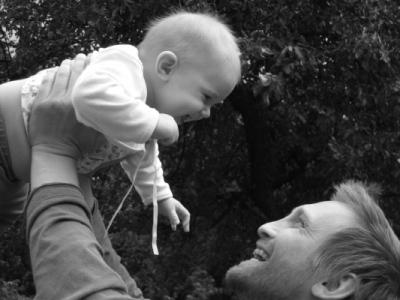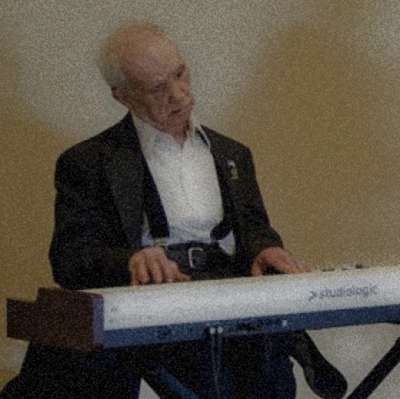.
.
“Resolution,” by N. Barry Carver, was the winning story in the twenty-eighth Jerry Jazz Musician Short Fiction Contest, and was originally published on November 8, 2011.
.
.
___
.
.

.
Resolution
by
N. Barry Carver
.
_________
.
…..It’s a shame that, in the 21st century, there are still men of my age who do not know who fathered them.
…..Setting aside the moral issues, I need to know about my family medical history and bloodlines. What if, trough twisted fate, my one true love was revealed to be my half sister? Or to find out, while facing an ill-informed press, that I am the progeny of some great hero, or desperate criminal, and under the presumption of similar habits. At forty-eight, I still don’t know if I should be honoring the birth of a savior, celebrating the miracle of lights, or dancing naked in the woods on the dark of the moon.
…..But morality has its part too. I never married. I have been very careful not to father a child… for, after all, what kind of man am I? In my cells and down in my secret soul, what am I destined to become? I have held the “nature versus nurture” debate my whole life and, I believe, I have been a good man. I am not deformed or handicapped. My brain functions at the level of my peers and my demeanor is such that I dare not speculate aloud that it is actually slightly superior. My development has been uneventful. I never had a stitch or broke a bone until I fell on my wrist two years ago.
…..So, what was so bad about me that… he didn’t want me?
…..Even my name, Devin Rhys Mann, is more a construct of chance than heredity. So I thought getting my DNA sequenced would clear up some of the questions – and it did to a great degree. I just didn’t know it would lead… here – to an “Extended Care Facility” next to the V. A. hospital in Los Angeles.
…..It’s clean enough I guess but, like all institutions of its kind, it is a hopeless place, full of pain and need.
…..In trying to remain true to the idea I have that I am a good man, I allowed my DNA report to be checked against the long lists of people waiting for transplants. Instantly it came back with a match – an exact match.
…..The request had come from a doctor in Santa Monica. An open request – meaning the anonymity of the recipient was not an issue. There, in crumpled letters on the faxed computer printout, was the name I never knew but that genetics guaranteed was my father. I only later found that it wasn’t really his name either.
…..“John Sierra” was the name he’d been given when he was found unconscious. It seems the police brought him to St. John’s on the 18th of December, and they name all unknowns sequentially – starting with “John Doe”, “John Echo” and so on. Having been brought in late in the year, they’d worked their way through the alphabet to the “S’s.” The most recent paperwork shows a correction and gives to him what I had come looking to get from him: my last name.
…..I called the hospice still in a state of shock but the urgent tone in his doctor’s voice convinced me to rush. Changing to larger planes at both Indianapolis and Denver, I arrived at LAX too late to do anything but find a room. I did not think myself overly excited or worried, but I did not sleep at all. As I’ve sat in the outer waiting room, I’ve had a chance, between the smells of disinfectants and the rising heartburn of an empty stomach, to think about what did keep me awake. It was anger.
…..How could he leave Mom and me to fend for ourselves without a word? She filed a police report only to be told that young actors here often change their names and disappear without a trace. She found it hard to imagine at first, but then rumor came back to her of his possible infidelities and her faith must have crumbled. As the years and hearsay went on, she finally accepted that he’d simply left us. We moved from Pico Rivera to the hills of Kentucky in 1959 – I was four years old.
…..A white-clad woman passed in front of me, to turn off another unimportant alarm, trailing a memory of seeing my mother in a similar costume. She never mentioned her time as a young “starlet” in Hollywood, and I’m surprised every time I recognize her in some Sunday afternoon movie filling time on the off-channels. I’m sure he must appear in a few as well. Perhaps they’d met during a TV series in the days of black-and-white. It was her only recurring part, which I’d found a couple years ago in an internet search. That role, in broadcast’s puritanical days, must have ended when she began to show, while carrying me.
…..Did he even bother to check on us? Did he know that she died just three years later and I, having no traceable roots, was passed through two foster homes before settling in with a small horse rancher and his wife? They had cleared all the obstacles to my adoption – only to lose their own son just weeks before I arrived. He was all that I was not, but they did their best to make me feel I was more than the poor substitute – which is how I saw myself. After the accident that took Tommy, they were never going to let me get anywhere near a horse. Both of them are gone now too and selling the ranch barely covered their final costs.
…..The doctor finally called me, and we sat in a tiny office just inside the main doors. A large window displayed an emergency room of sorts; curtain walls making room after room. No hospital scrubs here, just ordinary street clothes. The professionals couldn’t be detected from the visitors, if indeed there were any visitors. No one rushed. The emergencies they treated were half-hearted affairs where the outcome would, eventually, be the only ticket out of here that anyone ever gets.
…..Who was this man? Every image I have of the ‘50s is one, if not of innocence, then at least of respect for the status quo. Sure, trying to get acting work is stressful and destabilizing… but the jobs of husband and father are choices. Very few are ever really forced into these roles, and I just can’t imagine the cowardice it would take renege on those contracts.
…..How could he?
…..The doctor had been stammering about something while I was lost in thought – apparently the crisis had passed and my father was no longer in danger. I think, he was telling me that there was no reason to do anything more for him. He’d also said that he was not brought in on December 18th of this year, but I rejoined the conversation too late make any further heads or tails of it.
…..He stood up as if we had finished talking and showed me to one of the cubicles on the ward. I wasn’t really prepared when he opened the curtain. All of my emotions attacked me at once – all except sympathy. There lay a man half my size and more than half the way toward becoming a mummy. His body was contorted, wrist and arms bent into the shape that only long illness produces.
…..His sunken eyes and uneven wisps of beard disguised his face but in the mix I could still see the foundations of my own countenance. I hated him.
…..How dare he disparage my mother, leave me to an unknown fate and then, after all that neglect, allow himself to be found here in this pitiful state? His predicament would have melted the resolve of most – but not mine.
…..“How long does he have left?” I asked without flinching, it was really the only question left.
…..“Hours.”
…..“Fine.” I turned from the bed and headed for the door. I would not get the satisfaction of telling this pathetic old man how much of my good life he’d missed and what a lousy human being he was for doing so. Now that I’d thought so much on it, I guess this is really what I’d come all this way to say – and there was no one to hear it.
…..On the way out, they stopped me long enough to sign off on whatever they wanted to do with him next and gave me a discolored envelope bound with a string. I had already started the rental car when I decided to look inside.
…..As if holding its secret for too many years, the string snapped as I tried to untie it. Inside, on top of a bundle of papers, was just the insert from a wallet. It held two faded bus passes, eighty-eight cents in old coins… and a picture of Mom. I confess it stopped me. I didn’t expect to find an I.D. but to have no other picture but this fifty-year-old snapshot of the woman he left was shocking.
…..Amid the pile of medical notes that were the bulk of this packet, was a police report of the “John Doe” who had been brought in. The carbon copy was smudged illegible in many places – and the entire form was poorly hand written – but it told the story of a police chase following a bank robbery. Nothing impressive by today’s standards, but it ended with the gangsters’ car crashing through a crowd at a crosswalk at Lincoln and Colorado on December 17th, 1956.
…..An unattended infant was found in a stroller at the scene. The address on a script in the diaper bag led police to return the child home. A random woman, rushing for the bus, was killed in the crash. The police reasoned that, since the woman was a near neighbor, that the child was in her care when she was killed – though my mother, the report said, did not recognize the dead woman’s name or photo. This, I assumed, was another chapter of mistakes made by detectives more interested in clearing their caseload than match the facts to reality. An unrelated “John Sierra” wasn’t found until the next morning.
…..The impact had tossed him deep into pile of trash several feet from the corner. When sanitation workers found him, freezing, bleeding, twisted and discarded, it was a miracle he was still alive. If such a thing can be called a miracle.
…..Rifling through the old medical exams, I found it was true. The desiccated old man in there waiting to die had been first in the hospital, and then here, ever since.
…..His fits of consciousness never lasted more than a day or two in that first year. An emergency tracheotomy never allowed him to speak again, and although his right hand was crushed in the accident, the notes he had managed to write led doctors to the conclusion that his mind had been mutilated as well. He could not give his address or even his name. His left-handed scrawls, which he wordlessly demanded they read, only confirmed the diagnosis of mental incompetence.
…..Though none of those writings were included in the envelope, the Psych reports stated that, between incoherencies, he repeated a desire, a need, for finding the “divine.” Always misspelled, and gouged deep in the paper, he repeated it again and again, more demandingly each time, until he had to be sedated. During one such incident, where he’d tried to strangle an orderly ignoring his pleas, his mind snapped under the stress and he never truly awoke again.
…..With my face full of tears I’d held back since I was four, I made my way back to his bedside, sat respectfully down and waited for his hour to come. He died peacefully at 6:04 p.m. on Christmas day.
…..You might think I lost something that day – that my quest for father and family was killed by a random act when I was still in diapers.
…..You’d be wrong. While I still don’t know whether my salvation is entrusted to churches or temples or just to me – I do know more than the doctors ever could.
…..You see, through pain and drugged delusion, an inability to communicate normally and barriers too many to count, he gave me reason to celebrate this day. With that shaking hand he did not demand, as the doctors believed, the “divine” be delivered to him – though seeing the ultimate truth does take a bit of faith. Miraculously, that is exactly the particular piece of faith I have left.
…..In my heart of hearts, I know beyond any doubt that he was the one pushing my stroller that day.
…..You see, my name is Devin.
…..What my father wanted was me.
.
.
_____
.
.
Barry Carver is an author, actor and disabled veteran. Grammarly says he’s a bit long-winded, but he’s a fairly unique word-stringer and occasionally hits the sweet spot of a sentence, paragraph, or story, that makes it worth all the crazy turns and clauses. He’s a father of two boys who are presently in their teens – so kind thoughts are welcome. He still wishes he’d been an astronaut, or a bit taller, but not both. We’re all still waiting to see what he grows up to be.
.
.
___
.
.
.
.
.
.







































